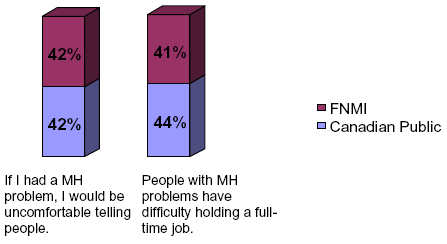
Canadian survey respondents perceive persons with schizophrenia, especially males, as potentially more dangerous compared to persons with other forms of mental illness, which corresponds with literature review findings. Footnote 93 FNMI survey respondents were less likely than were other Canadians to perceive persons with schizophrenia as dangerous, which accords with research findings that show less stigmatization of severe mental illness in non-Western cultures, including some Aboriginal and Inuit communities in Canada. Footnote 94
In focus group discussions, more nuanced responses emerged to the question of dangerousness, and participants said that the chances of a person with mental illness being unpredictable or dangerous would vary, depending on the type of illness, the severity of the illness, the effectiveness of treatment (especially use of medication) and the individual personality. Several said that persons with a mental illness might be more likely to pose a danger to themselves than to others. However, participants did view people with serious mental illnesses, particularly schizophrenia, as potentially more dangerous than people with other mental health problems.
Responses to other survey questions and comments made in focus group discussions suggest that a significant minority of Canadians continue to hold stigmatizing attitudes towards mental disorders, and that many believe that others subscribe to these views. Survey results (Figure 6) show that many would be uncomfortable revealing a mental disorder and many believe that people with mental health problems would have difficulty working full-time.
Figure 6: Stigmatizing Attitudes towards Mental Health Problems
National Survey Results
The focus participants agreed strongly that stigma and discrimination against people with mental illness still exist in Canadian society, and some suggested that people would suffer until they have no choice but to seek help, due to fear of stigma. Some said that there is still a stigma from medical professionals toward people with a mental illness, and some reported having had bad experiences with mental health professionals, or knowing someone who has. This is not uncommon–care providers do sometimes stigmatize persons with mental health problems, and stigmatizing behaviour from professionals can influence treatment continuation. Footnote 95
Return to note 93 Pescosolido et al, 1999; Crisp et al, 2000; Phelan et al, 2000; Mann and Himelein, 2004
Return to note 94 Littlewood, 1998; Kirmayer et al, 2000
Return to note 95 Sirey et al, 2001; Watson and Corrigan, 2001; Gray, 2002